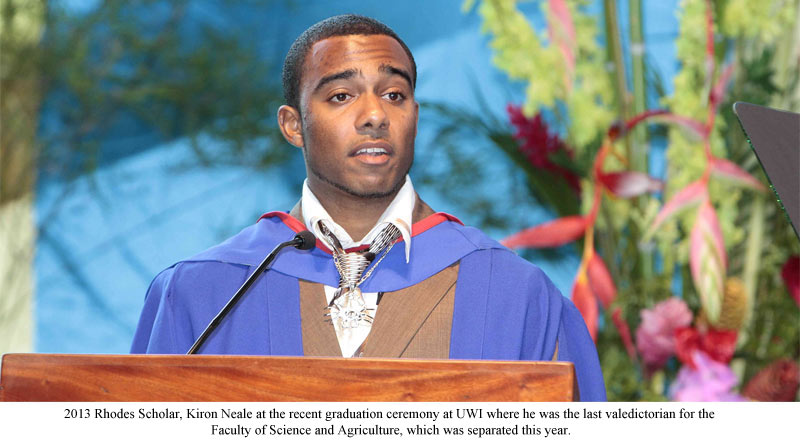 |
 |
 |
|
November 2012 |
Valedictorian wins Rhodes Scholarship
A Trinidadian has won the 2013 Commonwealth Caribbean Rhodes Scholarship. Cornelius Kiron Neale, a 22-year-old graduate of The UWI, St Augustine campus, beat five other applicants from Jamaica, Barbados and Dominica to win what is considered to be the most prestigious postgraduate scholarship in the world. Neale, this year’s valedictorian for the Faculty of Science and Agriculture at The UWI (the final valedictorian as the Faculty was separated into two this year), is only the tenth Trinidadian to win the Commonwealth Caribbean Rhodes Scholarship since its inception; the last Trinidadian to win was another UWI graduate, Kyla Thomas, in 2003. While at Oxford University in England, where the award is tenable, Neale intends to pursue a Masters in Environmental Change and Management, with an emphasis on climate change and its repercussions for the Caribbean. Coming from Marabella, Neale said he is “quite humbled by the moment” and he believes “his ambition for the Caribbean region” may have given him the edge over the other students. “My main area is energy and the environment,” he explained. “I plan on diversifying the region’s energy in terms of solar energy. That is my particular area of research, especially with Trinidad and Tobago and the hydrocarbons that we have been using. “I have done my research on governmental housing to get away from the conventional oil and gas, and it is something that can be spread throughout the Caribbean, because we are blessed with a lot of solar and alternative energy. I think my ambition to drive the Caribbean forward into using renewable energy might be a key factor that may have played out today,” he said. Secretary of the Selection Committee, Peter Goldson, a former Jamaica Rhodes Scholar, said all of the candidates were worthy, but Neale’s interview put him over the top. “We had to make sure that the candidates were of a very high calibre,” explained Goldson. “The committee tries to test them to see who is the strongest. In our discussions at the end, there were a number of them who were in contention as the possible winner. “But the committee thought that Mr. Neale was most deserving of the scholarship this year. We are delighted to have announced him as the winner.” Over the last 50 years of the award, the majority of the winners of the Commonwealth Caribbean scholarship have come from Jamaica, which also receives its own annual Rhodes scholarship. Well-known former Rhodes scholars include the late Professor Rex Nettleford, Vice-Chancellor Emeritus of The UWI, former Jamaican Prime Minister Norman Manley, and former United States President Bill Clinton. The Rhodes scholarship is named after Cecil John Rhodes, a British diamond magnate and imperialist, after whom the colony of Rhodesia (now Zimbabwe) was named. In his will, Rhodes bequeathed the greater part of his substantial fortune to establish the scholarship scheme. Candidates for Rhodes Scholarships are selected on the basis of qualities of character as well as intellect. Rhodes’ aim was to provide future leaders of the English-speaking world with an education which would broaden their views and develop their abilities. He chose to endow these scholarships at Oxford University because he believed its residential colleges provided an environment that was conducive to personal development. Rhodes hoped that those who benefited from his scholarships would go on to improve the lot of mankind, and work towards maintaining peace between nations. The Rhodes scholarship is awarded based on:
In recognition of the centenary of the foundation of the Rhodes Trust in 2004, four Oxford alumni were awarded honorary degrees by the university, including the late Professor Rex Nettleford, Vice-Chancellor of the University of the West Indies, author, dancer and choreographer. The Rhodes Trust also established the Rex Nettleford Fellowship in Cultural Studies at The UWI, an annual award given to a resident of the Caribbean under the age of 35 worth £10,000, with an associated travel grant of £2,000, for all areas of scholarship in the field of cultural studies, including the creative and visual arts. |

